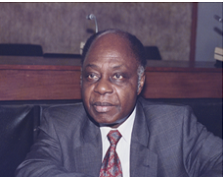 ReConnect Africa is a unique website and online magazine for the African professional in the Diaspora. Packed with
essential information about careers, business and jobs, ReConnect Africa keeps you connected to the best of Africa.
ReConnect Africa is a unique website and online magazine for the African professional in the Diaspora. Packed with
essential information about careers, business and jobs, ReConnect Africa keeps you connected to the best of Africa.

International Maritime and Environmental Law Advisor

Educated at Achimota School, Ghana, H.E. Judge (Dr.) Thomas Mensah is a graduate of the University of Ghana, holds law degrees from the University of London and Yale University Law School and a doctorate from Yale. His career began in the civil service of the Gold Coast (Ghana) in 1956 and, following a brief stint with the United Africa Company, he joined the University of Ghana as an Assistant Registrar. Following his years at Yale University and a period working in Vienna, Judge Mensah joined the United Nations International Maritime Organisation in London in 1968 to head the newly created Legal Division.
In 1981 he was appointed Assistant Secretary General of the IMO, eventually retiring from the organisation in 1990. Judge Mensah subsequently held a number of positions including consulting to the United Nations Environment Programme (UNEP), Director of the Law of the Sea Institute at the University of Hawaii and visiting Professor of Law at Leiden University in the Netherlands.
In 1995 Judge Mensah was appointed Ghana’s first High Commissioner to the Republic of South Africa and presented his credentials to President Nelson Mandela. Elected in August 1996 as a Judge in the newly established United Nations International Tribunal for the Law of the Sea in Hamburg, Germany, he was subsequently elected by the Judges of the Tribunal as the first President of the Tribunal.
Judge Mensah’s contribution to his field was formally recognised in May 1998 when he was inducted into the International Maritime Hall of Fame in New York, his nomination being presented by Kofi Annan, the former Secretary-General of the United Nations.
I was educated…
…Achimota School, Ghana, then at the University College of Gold Coast (later University of Ghana) where I gained a BA in Philosophy. I then took a Law degree, at the University of London, graduating with the LLB. Degree. Following a postgraduate course at the Yale University Law School, I was awarded a Masters in Law in 1962 and a Doctor of Juridical Sciences degree in 1964.
My first job was…
…Administrative Officer in the Civil Service of the Gold Coast (Ghana) from 1956 to 1958, followed by a short stint with United Africa Company (a subsidiary of Unilever).
What I do now is…
…Since retiring as a Judge from the International Tribunal for the Law of the Sea, I provide advisory and consultancy services to governments, international organisations and law firms on issues related to international law, international maritime law and the law of the sea and international environmental law.
What I learned along the way is…
…that hard work and personal discipline are essential for success in whatever field one happens to be operating. I have also come to appreciate more and more the importance of tolerance in all things; in particular, the willingness and ability to accept and appreciate the views and beliefs of others even when one is unable to agree with them.
My greatest influence has been…
…from two personalities whom I encountered at different stages in my education. The first was Mr. Ephraim Amu, the celebrated Ghanaian musicologist. He was Music master while I was at Achimota School and a Professor at the University of Ghana during my tenure as a Lecturer. Although Mr Amu (generally referred to as Owura Amu) did not actually teach me, he made a lasting impression on me with his wisdom, with the simplicity that marked his appearance and behaviour, the intellectual and spiritual humility which he exuded without the slightest hint of conscious effort. He was a man with deeply held pride in his African heritage, but he also had the generosity to recognise that other people could have an equally strong attachment to theirs. The second person who influenced me greatly was my Professor at Yale Law School, Professor Myles MacDougal. He instilled in me, even at that rather late stage in my personal and intellectual development, the importance of intellectual honesty and the obligation to follow the argument to wherever the evidence and logic may lead you, even if this means having to change your most cherished positions.
The best advice I ever received is…
…that, in order to receive the respect and consideration of the people with whom one deals, one must show respect and concern for every one of them, no matter how big or small they may be. In the words of my mother, “if you want the people who work for you to treat you like a god, you have to learn to treat them all like human beings.”
